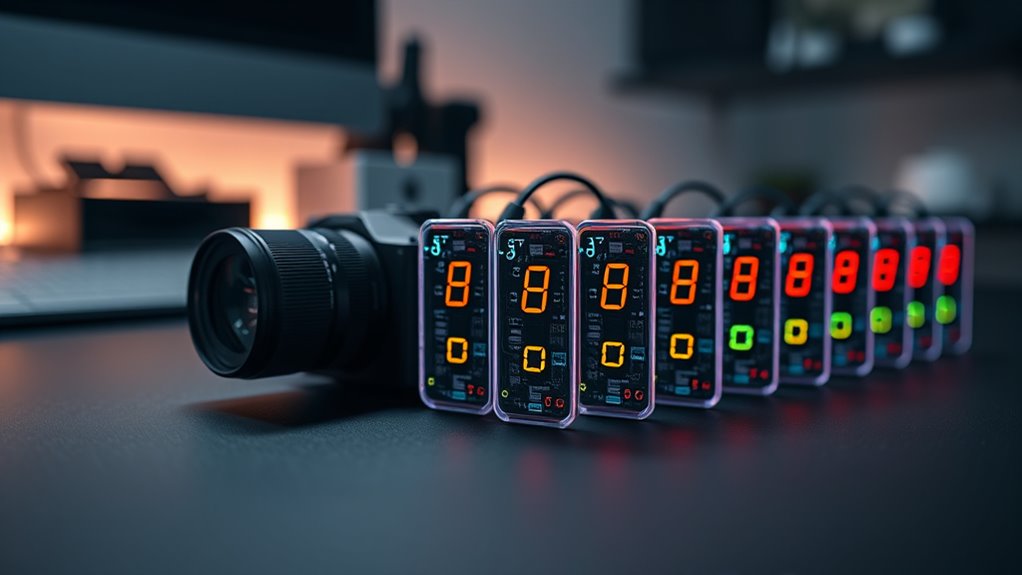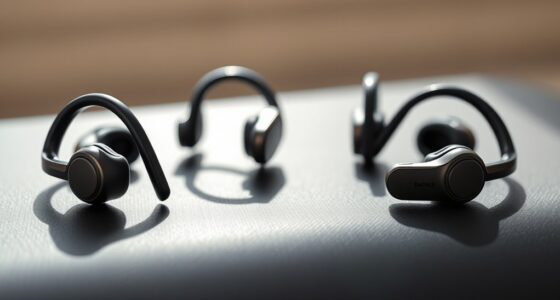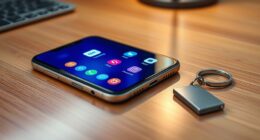If you want to optimize your charging, I recommend checking out the 15 best USB-C power meters that support fast charging protocols like PD, QC, and VOOC. These units offer accurate voltage, current, and power measurements, helping you troubleshoot and improve performance. Many feature bright displays, compact designs, and high wattage capacity up to 240W. Keep in mind durability and compatibility when choosing. Continue along, and I’ll show you what makes each one a great pick.
Key Takeaways
- Choose models supporting multiple fast-charging protocols (PD, QC, VOOC) for broad device compatibility and optimal charging speeds.
- Prioritize high measurement accuracy (±1-3%) and high wattage capacity (up to 240W) for reliable diagnostics and fast charging.
- Opt for devices with clear, rotatable displays and real-time data visualization for easy monitoring in various environments.
- Select durable, portable units with robust construction and resistance features suitable for frequent use and outdoor testing.
- Consider additional features like data logging, temperature measurement, and bidirectional current support to enhance troubleshooting and performance optimization.
Eversame 2-in-1 USB Type-C Tester with LCD Display

If you’re a tech enthusiast or professional who needs accurate, real-time data on your USB-C devices, the Eversame 2-in-1 USB Type-C Tester is an excellent choice. It features a bright color LCD screen that displays voltage, current, power, and more, making it easy to monitor your devices. With digital multimeter capabilities and a voltage range of 3.6V-30V, it supports fast-charging protocols like QC3.0, QC2.0, BC1.2, and PD. Compact and lightweight at just 1.1 ounces, it’s perfect for testing chargers, power banks, and troubleshooting. Its multiple display modes and simple controls make it a versatile, reliable tool for accurate USB-C testing.
Best For: tech enthusiasts and professionals who require accurate, real-time USB-C device testing and troubleshooting.
Pros:
- Supports multiple fast-charging protocols including QC3.0, QC2.0, BC1.2, and PD for versatile compatibility.
- Features a bright color LCD display showing comprehensive data such as voltage, current, power, and more for easy monitoring.
- Compact, lightweight design (1.1 ounces) making it portable and convenient for field testing and on-the-go use.
Cons:
- Small display text may be difficult to read outdoors or in bright environments.
- Some units may experience malfunction or durability issues after prolonged use, with limited warranty support.
- Initial operation and button functions may require familiarization for new users to fully utilize all features.
YOJOCK USB C Power Meter, Voltage & Current Tester (Classic Version)
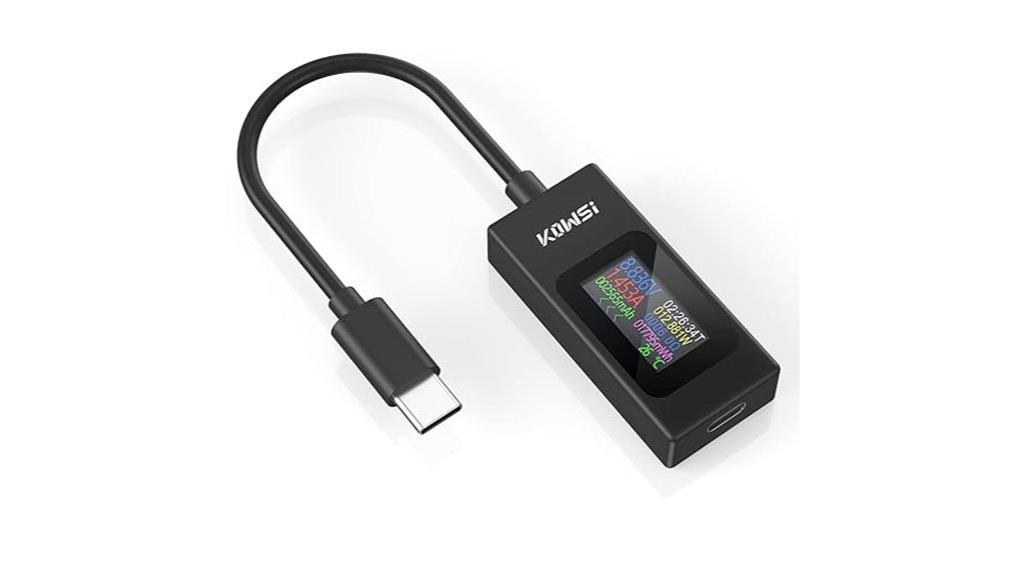
The YOJOCK USB C Power Meter (Classic Version) is an excellent choice for electronics enthusiasts and digital gamers who want precise, real-time data on their charging devices. It measures voltage (4-30V), current (up to 6.5A), power, capacity, and temperature, supporting fast charging protocols like QC2.0/3.0/4.0 and Super VOOC. With power-off data storage, you can review capacity and energy after charging. The device is easy to use, with buttons for cycling screens and clearing data. It’s ideal for troubleshooting, verifying charger performance, and testing cables, making it a versatile tool for optimizing your charging setup.
Best For: electronics enthusiasts, digital gamers, and DIY hobbyists seeking precise real-time data on USB-C charging performance.
Pros:
- Accurate measurement of voltage, current, power, and capacity for comprehensive diagnostics.
- Supports multiple fast charging protocols like QC2.0/3.0/4.0 and Super VOOC, enhancing compatibility.
- Power-off data storage allows post-charge review, aiding in performance analysis.
Cons:
- Small display font can be difficult to read for some users, especially older individuals.
- May experience reset issues when current exceeds approximately 4.5A, limiting high-current testing.
- Compatibility issues with certain power supplies, showing 5V but zero current, which can hinder troubleshooting.
2 Pack USB C Adapter with Digital Display
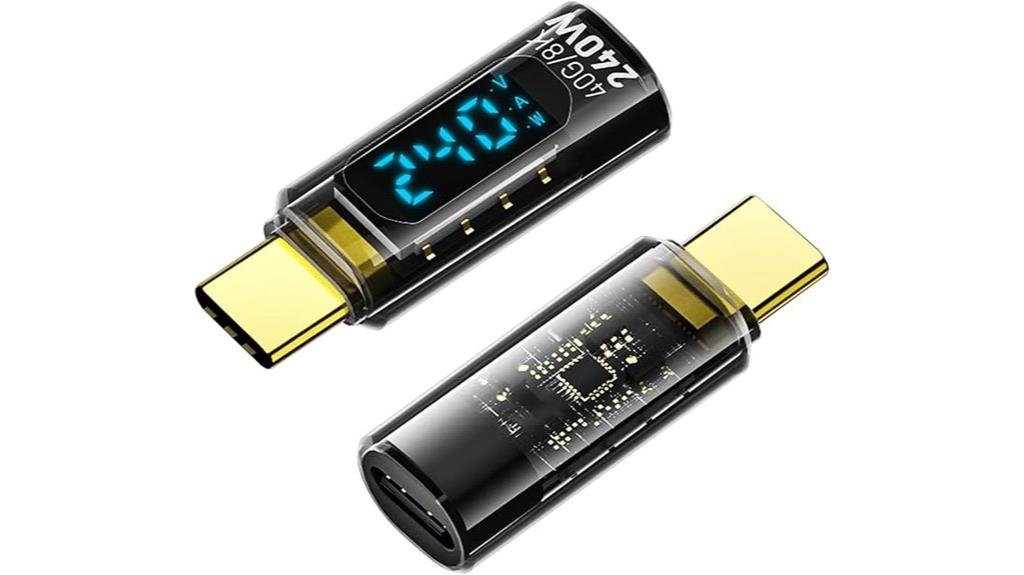
For anyone who needs precise monitoring of their charging setup, the Jadebones 2 Pack USB C Adapter with Digital Display is an excellent choice. These adapters deliver up to 240W PD fast charging and support USB 4 with 40Gbps data transfer, making file sharing quick and effortless. The bright LED display shows real-time voltage, current, and power, giving you clear insight into your charging status. Compact and lightweight, they’re easy to use and fit into tight spaces. Customers praise their build quality and accuracy, especially for diagnosing power issues. While the display’s orientation can be a bit inconvenient, overall, these adapters combine high performance with useful monitoring features.
Best For: users who need precise, real-time monitoring of their fast-charging setup and high-speed data transfer for USB-C devices.
Pros:
- Supports PD 240W fast charging for rapid device power-up
- Bright LED digital display provides accurate voltage, current, and power readings
- Supports USB 4 with 40Gbps data transfer and 8K@60Hz video output
Cons:
- Display orientation can be inconvenient, sometimes appearing upside down
- Small size makes the adapters easy to misplace or lose
- Bright LED screen may be difficult to see outdoors in bright sunlight
Diymore USB C Power Meter Tester with Color Screen
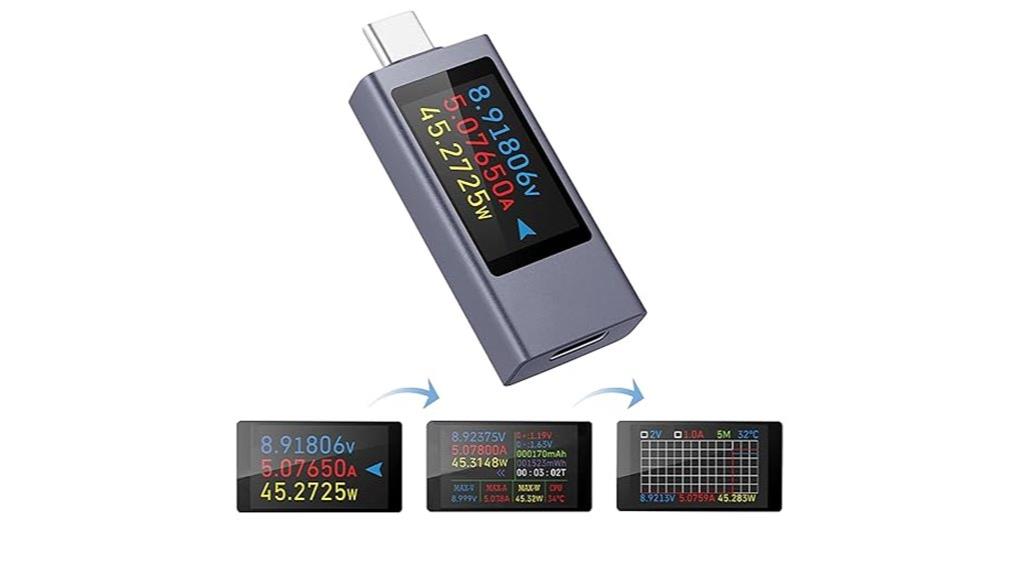
Diymore’s USB C Power Meter Tester with Color Screen stands out as an ideal tool for tech enthusiasts, technicians, and anyone wanting precise insights into their charging setup. Its compact, digital design features a bright, rotatable color display showing voltage, current, power, and temperature in real time. Supporting multiple protocols like PD, QC, VOOC, and more, it guarantees compatibility across devices. The device can measure up to 240W and store test data automatically, even after disconnection. It’s perfect for troubleshooting, verifying charger performance, and monitoring power flow. Despite some minor interface stiffness, its reliable readings and user-friendly design make it an essential gadget for optimizing charging efficiency.
Best For: tech enthusiasts, technicians, and everyday users seeking precise, real-time insights into their charging performance and compatibility.
Pros:
- Supports multiple charging protocols including PD, QC, VOOC, and more for broad device compatibility
- Features a bright, rotatable color screen with real-time voltage, current, power, and temperature display
- Capable of measuring up to 240W and automatically storing test data for accurate long-term monitoring
Cons:
- Requires active current flow to power on; the screen remains blank if no load is present
- Interface button can be stiff, needing firm presses to switch modes
- Protective screen cover is tightly fitted and may be difficult to remove initially
240W USB C Adapter Power Meter Tester (2 Pack)

If you’re serious about monitoring your USB-C devices’ charging performance, the W USB C Adapter Power Meter Tester (2 Pack) is an excellent choice. It features a bright LED digital display that shows watts, volts, and amps, rotating between metrics for quick readings. Compatible with most Type-C devices like MacBooks, iPads, and smartphones, it supports up to 240W PD fast charging and 40 Gbps data transfer speeds. Compact and plug-and-play, it requires no drivers. Ideal for testing cables, diagnosing power issues, or verifying device health, it offers reliable, accurate measurements—even at high wattages—making it a versatile tool for both casual and professional use.
Best For: professionals and enthusiasts who need accurate, real-time monitoring of USB-C charging performance, cable testing, and device diagnostics.
Pros:
- Accurate digital display showing watts, volts, and amps with quick updates
- Supports high power output up to 240W and high data transfer speeds up to 40 Gbps
- Compact, portable, and easy to use without requiring external drivers or software
Cons:
- Display cycles through metrics every 5-10 seconds, which can be distracting for continuous readings
- Some units may experience durability issues after a few months of use
- Limited to cycling between metrics rather than providing a static, single value display
Plugable USB C Power Meter Tester for Monitoring USB-C Connections

The Plugable USB C Power Meter Tester stands out as an ideal tool for tech enthusiasts and professionals who need precise monitoring of USB-C power and data flow. It measures voltage, amperage, and wattage up to 240W, supporting USB Extended Power Range from 5V to 48V. Its compact design and durable connections make it portable and easy to use, with an OLED display that shows real-time data and current flow direction. Compatible with most USB-C devices, it’s perfect for troubleshooting, verifying fast charging, and testing cables. Its driverless operation and straightforward interface make it accessible, ensuring you get accurate insights without hassle.
Best For: tech enthusiasts, professionals, and troubleshooting experts who need accurate real-time monitoring of USB-C power and data flow.
Pros:
- Measures voltage, current, and wattage up to 240W with high accuracy.
- Compact, portable design with durable USB-C connections for reliable use.
- User-friendly OLED display with screen rotation and real-time data visualization.
Cons:
- Not compatible with Thunderbolt 3 devices.
- Requires connection to a power source, limiting portability in some scenarios.
- Does not track cumulative energy consumption over time.
USB C Power Meter Tester for Voltage & Current Measurement

A USB-C Power Meter Tester is an ideal tool for anyone who needs precise voltage and current measurements during charging or testing devices. It features a clear display with three pages showing real-time voltage, current, power, capacity, energy, timing, and CPU temperature. It records maximum values and supports multiple fast-charging protocols like PD, QC, VOOC, and more, ensuring broad compatibility. Its small size makes it portable, while a backside button allows easy screen flipping. Perfect for testing chargers, batteries, and cables, it offers quick, accurate data, making it an essential device for diagnosing and optimizing your charging setup.
Best For: tech enthusiasts, testers, and professionals who need accurate, real-time data on charging performance, battery health, and cable quality.
Pros:
- Supports multiple fast-charging protocols for broad device compatibility
- Records maximum voltage, current, and power for performance analysis
- Compact and portable design with easy screen flipping for convenient use
Cons:
- Small size may be difficult for users with larger fingers or poor vision
- Limited display size can impact readability for some users
- Proper handling is required to avoid issues like charging failure or device malfunction
Power-Z C240 Portable USB-C Power Meter
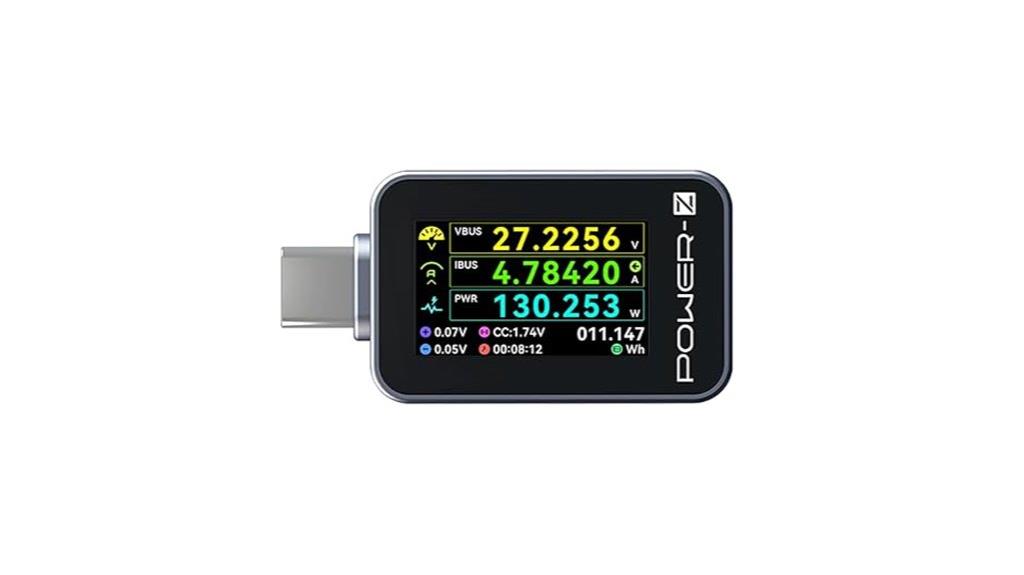
For anyone needing a reliable, portable tool to monitor USB-C charging performance, the Power-Z C240 Portable USB-C Power Meter stands out with its support for up to 240W and bidirectional current measurement. Its durable metal shell guarantees longevity, while its lightweight design (just 0.41 ounces) makes it easy to carry. The 1.14-inch color display provides clear readings of voltage, current, power, energy, and timers, helping you verify device performance and cable quality. Compatible with nearly all USB-C devices and supporting high-power testing, the C240 is an excellent choice for both personal and professional use, offering accurate insights into your charging setup.
Best For: those seeking a portable, reliable USB-C power meter for verifying charging performance, cable quality, and power source efficiency in both personal and professional settings.
Pros:
- Supports high-power testing up to 240W and bidirectional current measurement for comprehensive analysis.
- Compact, lightweight design with a durable metal shell and a clear color display for easy reading.
- Compatible with nearly all USB-C devices and capable of testing USB-A devices via an adapter.
Cons:
- Can run hot when used with high-power chargers like MagSafe3, potentially stressing connected devices or cables.
- May interfere with data transfer when connected to USB SSDs or docking stations, limiting data communication capabilities.
- Small display font can be difficult to read without magnification, and it lacks a protective screen cover, risking scratches.
Klein Tools USB Power Meter (ET920)

If you’re seeking a reliable tool to troubleshoot USB power issues, the Klein Tools ET920 USB Power Meter stands out with its ability to measure voltage, current, capacity, and energy across USB-A and USB-C ports. Its compact, rugged design includes 6.6 feet of drop protection, making it durable for daily use. The high-resolution LCD provides clear readings, while safety overload detection ensures protection. It’s versatile for testing Qualcomm Quick Charge ports and other USB devices. However, some users experience inconsistent readings on USB-C, and it lacks real-time wattage display or data retention. Despite these limitations, it’s a valuable tool for diagnosing power problems and verifying charger and cable performance.
Best For: tech professionals and enthusiasts who need accurate, real-time diagnostics of USB power delivery and cable performance.
Pros:
- Measures voltage, current, capacity, and energy with high resolution for detailed analysis
- Durable, compact design with 6.6 ft. drop protection suitable for daily use
- Compatible with USB-A and USB-C ports, including Qualcomm Quick Charge testing capabilities
Cons:
- Inconsistent readings and potential failure on USB-C input/output after multiple uses
- Lacks real-time wattage display and data retention features for continuous monitoring
- Small LCD may be difficult to read for some users, and no data storage limits analysis capabilities
Plugable USB C Power Meter Tester for USB-C Monitoring
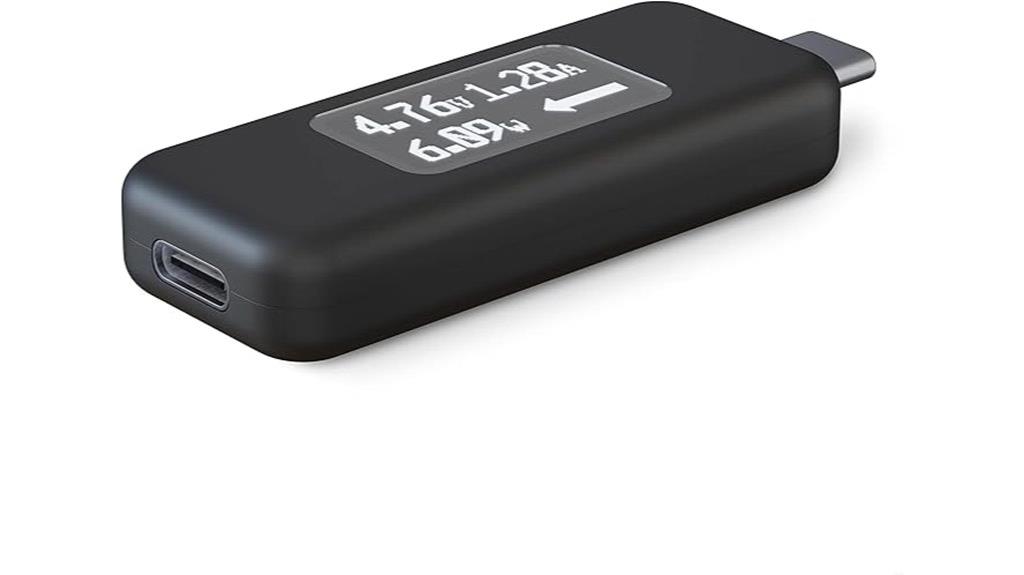
The Plugable USB C Power Meter Tester stands out as an essential tool for anyone who wants to guarantee their USB-C charging setup is safe and efficient. It monitors voltage, current, and power in real-time, supporting full USB Power Delivery and data pass-through, including video output. Compact and durable, its bright OLED display is easy to read, with reversible orientation for convenience. While not compatible with Thunderbolt 3 devices, it reliably tests chargers, cables, and accessories inline. Its sturdy aluminum shell ensures durability, and users praise its accuracy for diagnosing power draw and verifying cable quality, making it a versatile addition to any tech toolkit.
Best For: tech enthusiasts, repair professionals, and everyday users who want accurate real-time monitoring of USB-C charging, power, and data flow.
Pros:
- Provides precise voltage, current, and wattage readings for diagnostics.
- Supports full USB Power Delivery and data pass-through, including video output.
- Compact, durable build with a bright OLED display and reversible orientation.
Cons:
- Not compatible with Thunderbolt 3 devices.
- Limited to real-time measurements; lacks total mAh transfer data.
- Display orientation can be challenging depending on port placement on certain devices.
USB C Power Meter, Voltage & Current Tester (KWS-2303C)
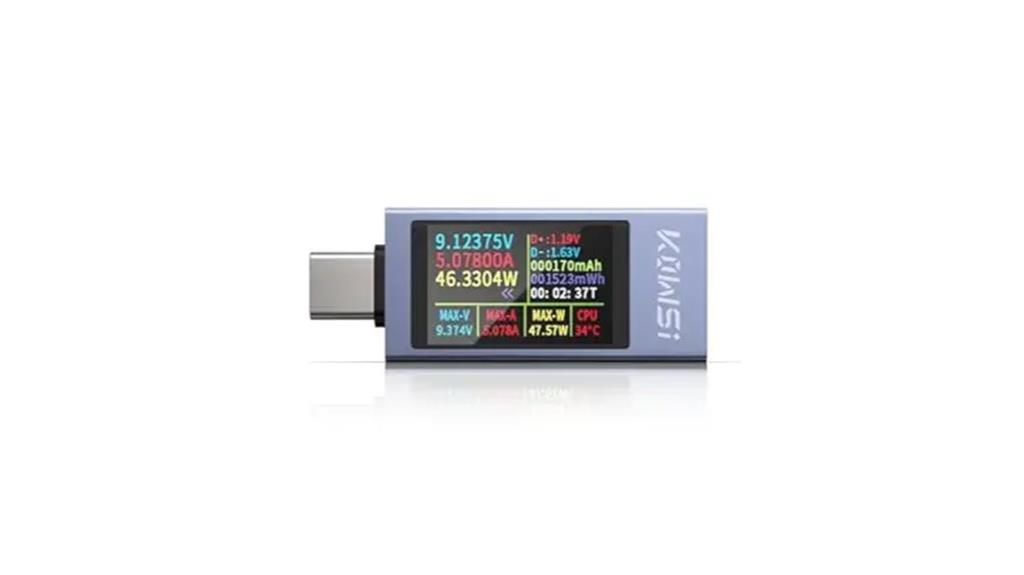
The USB C Power Meter, Voltage & Current Tester (KWS-2303C) stands out as an essential tool for anyone who needs precise measurement and monitoring of charging performance. It offers high accuracy with ±(1%+5) and measures voltage from 4V to 30V, current up to 12A, making it versatile for various devices. Supporting fast charging protocols like PD, QC, VOOC, and more, it guarantees compatibility and reliable detection. Its upgraded features include real-time voltage and current curves, customizable monitoring durations, and a clear 1.06-inch color display showing detailed metrics. Built with durability in mind, it’s a cost-effective solution for optimizing charging efficiency and device health.
Best For: tech enthusiasts, mobile device users, and professionals seeking accurate testing and monitoring of USB-C charging performance.
Pros:
- High measurement accuracy of ±(1%+5) for precise readings
- Wide voltage (4V-30V) and current (up to 12A) range suitable for various devices
- Supports multiple fast charging protocols for versatile compatibility
Cons:
- Minor screen scratches reported by some users, affecting display clarity
- Requires familiarity with technical measurements for optimal use
- Limited to USB-C devices, not compatible with other charging interfaces
diymore USB C Power Meter, Digital Multimeter with LED Display

Designed for DIY enthusiasts, technicians, and travelers, the diymore USB C Power Meter offers a compact, portable solution for testing and troubleshooting USB-C devices. It measures voltage (4-30V) and current (0-6.5A), with a bright LED display showing real-time data. Its multi-functionality includes capacity, power, temperature, resistance, and charging time tracking, plus data saving with power failure memory. The device’s small size (just over 2 inches) and included 14cm extension cable make it easy to carry and use anywhere. Perfect for diagnosing charging issues, evaluating device health, or monitoring power supply quality, it’s a versatile tool for tech-savvy users.
Best For: DIY enthusiasts, technicians, and travelers seeking an affordable, portable tool for testing and troubleshooting USB-C devices and power supplies.
Pros:
- Compact, lightweight design with included extension cable for versatile use
- Multi-functionality with real-time measurement of voltage, current, capacity, and more
- Supports data saving with power failure memory to ensure data persistence
Cons:
- Limited accuracy with approximately ±5% margin on current measurements
- Durability issues such as metal plug detachment after repeated use
- Basic features lacking advanced profiles like PD/QC support found in more expensive testers
USB C Power Meter, Digital Voltage & Current Tester

If you’re looking to monitor your USB-C charging performance with high precision, a digital voltage and current tester like this power meter is the perfect tool. It measures voltage (4.5-50V), current (0-12A), power, capacity, energy, and temperature, recording maximum values for detailed analysis. Supporting nearly all Type-C protocols—including PD2.0, QC3.0, VOOC, and DASH—it offers two-way measurement to check device charging status and speed. With a high-definition color screen, 360° rotation, and multiple display modes, it provides real-time data in a compact, easy-to-use design. Despite some reliability concerns, it’s highly valued for evaluating chargers, cables, and power banks across various devices.
Best For: tech enthusiasts, professionals, and everyday users seeking accurate, versatile monitoring of USB-C charging performance.
Pros:
- Provides precise measurements of voltage, current, power, and energy with high accuracy.
- Supports a wide range of protocols including PD2.0, PD3.0, QC3.0, VOOC, and DASH for comprehensive testing.
- Compact, user-friendly design with a high-definition color screen and 360° rotation for easy viewing.
Cons:
- Some units experience display failures within two months, raising concerns about reliability.
- Short connector length makes it difficult to use with smartphones wearing cases.
- Limited to inline testing; cannot independently test power sources without being connected in a circuit.
YOJOCK 360W USB C Power Meter and Tester
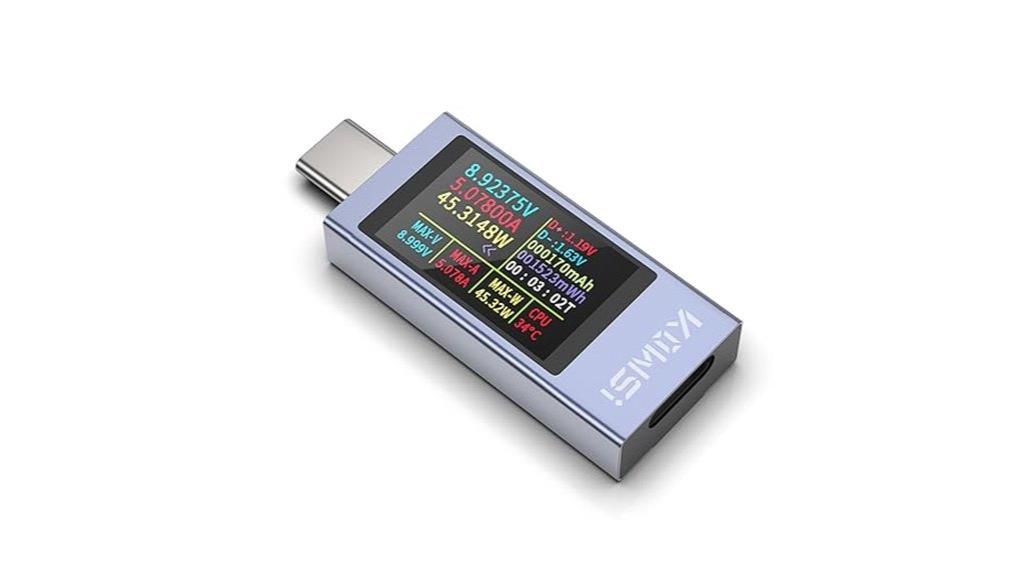
For anyone looking to accurately diagnose and enhance their USB-C charging setup, the YOJOCK 360W USB C Power Meter and Tester stands out as a reliable and versatile tool. It measures voltage (4V-30V), current (0-12A), and power, supporting fast charging protocols like PD2.0/3.0, QC2.0/3.0, VOOC, and more. Its compact, durable aluminum design features a bright display that shows multiple parameters simultaneously and can invert for readability. The upgraded curve function provides real-time voltage/current monitoring over adjustable periods, while power-off storage retains data for analysis. Overall, it’s an excellent device for troubleshooting, verifying chargers, and ensuring maximum device performance.
Best For: tech enthusiasts, troubleshooting experts, and anyone needing precise diagnostics of USB-C charging performance and compatibility.
Pros:
- Supports a wide range of fast charging protocols including PD2.0/3.0, QC2.0/3.0, and VOOC, ensuring versatile compatibility.
- Compact, durable aluminum design with a bright display that shows multiple parameters simultaneously for easy monitoring.
- Upgraded curve function offers real-time voltage/current data over adjustable periods, aiding detailed analysis.
Cons:
- Limited lifespan reported by some users, approximately 6 months before needing replacement.
- Only displays source info after device connection, which can delay initial troubleshooting.
- Slightly higher price point under €15, but still considered good value given its features.
USB C Power Meter, Voltage & Current Tester for Fast Charging

The USB-C Power Meter with voltage and current testing capabilities is an essential tool for anyone who wants to optimize and troubleshoot fast charging setups. It detects voltage from 3.3V to 36V, current up to 12A, and measures power, capacity, temperature, resistance, and charging time. Supporting protocols like PD, QC, VOOC, and more, it automatically detects and displays data in real-time. Its compact CNC metal casing is durable and portable, with a high-definition IPS display for easy reading. Whether testing wall chargers, cables, or power banks, this meter helps verify performance, troubleshoot issues, and ensure your devices charge efficiently and safely.
Best For: tech enthusiasts, researchers, and troubleshooting professionals who want to optimize and verify fast charging performance of USB-C devices.
Pros:
- Accurate real-time measurement of voltage, current, power, and charging protocols.
- Supports multiple fast charging protocols including PD, QC, VOOC, and more.
- Compact, durable design with a high-definition IPS display for easy data reading.
Cons:
- Limited support up to PD 3.0, not compatible with PD 3.1 or newer standards.
- Requires manual setup or QR code download for language change from Chinese to English.
- Fewer advanced features compared to higher-end models with higher amperage ratings.
Factors to Consider When Choosing USB‑C Power Meters
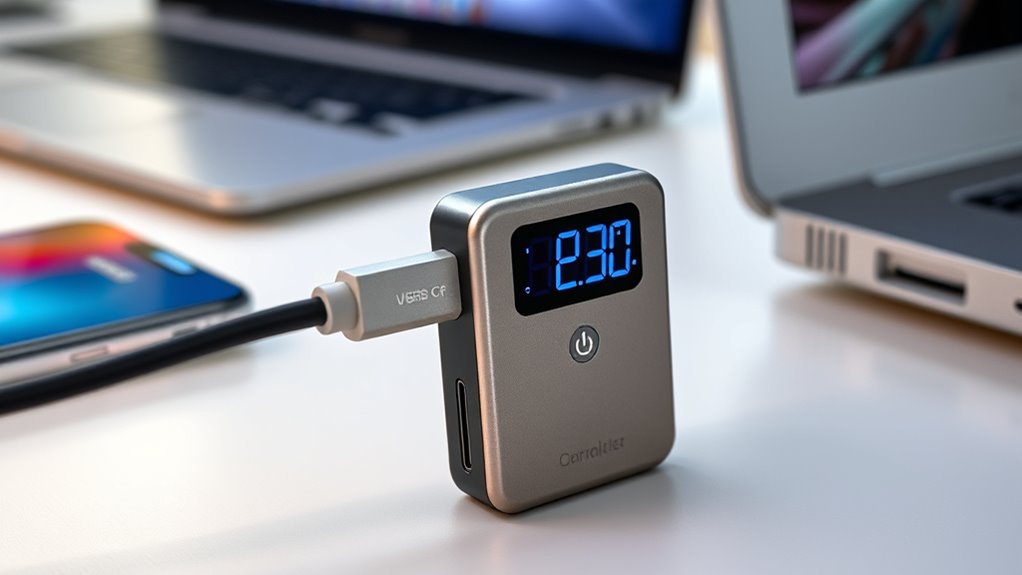
When selecting a USB-C power meter, I focus on key factors like measurement accuracy, supported protocols, and display clarity to guarantee reliable readings. Compatibility with my devices and build quality also matter, so the meter lasts and functions well across different ports. Knowing what to prioritize helps me find a tool that fits my needs perfectly.
Measurement Accuracy and Range
Choosing a USB-C power meter with high measurement accuracy is essential for obtaining reliable data, as small errors can considerably impact power analysis. Look for devices offering ±1% to ±3% precision in voltage and current readings to ensure dependable results. The measurement range should cover typical operating voltages from 5V to 20V and currents up to 6.5A or higher, matching the needs of most USB-C devices. Accurate power calculation depends on precise voltage and current measurements, so calibration and minimal measurement error are crucial. Additionally, consider the resolution and sampling rate, which influence how well the meter captures rapid fluctuations. A meter with a broad measurement range and high accuracy provides a clearer picture of your charging setup, helping you optimize performance and troubleshoot effectively.
Supported Charging Protocols
Supporting the right charging protocols is crucial because not all USB‑C power meters can accurately detect or handle every standard your devices use. I look for a meter that supports fast charging protocols like Power Delivery (PD), Quick Charge (QC), FCP, SCP, AFC, PE, DASH, VOOC, and SuperVOOC to guarantee compatibility across my devices. It’s important that the meter can identify and display the specific protocol in use, so I can verify proper power transfer. Additionally, I check if it supports high wattage levels—up to 100W or 240W—needed for faster charging. Protocol-specific features like automatic detection and performance measurement help me troubleshoot and optimize my setup. A versatile power meter that handles multiple protocols seamlessly ensures I get accurate readings regardless of my device’s charging standard.
Display Clarity and Size
A clear and appropriately sized display is essential for quickly understanding your USB‑C power meter’s readings, especially in challenging environments. A larger screen improves readability, making it easier to see data in low-light conditions or if you have poor eyesight. High-contrast fonts and icons help you recognize measurements fast, reducing errors. Brightness should be adjustable or bright enough to be visible outdoors or in bright settings. Display resolution also matters; a detailed screen allows you to interpret voltage, current, and other data at a glance. Additionally, a reversible or rotatable screen provides flexible viewing angles, making it more convenient to read measurements from different device orientations. Overall, a well-designed display enhances usability and ensures accurate, quick readings in any situation.
Device Compatibility and Ports
When selecting a USB-C power meter, it’s crucial to verify that it supports the voltage and current ranges your devices require, such as up to 36V and 12A or more. Compatibility with charging protocols like Power Delivery (PD), Quick Charge (QC), and others guarantees it can accurately monitor various fast-charging standards. Additionally, check if the power meter supports the specific port type you need—USB-C to USB-C, USB-A to USB-C, or multi-port setups—so it fits seamlessly with your devices. Consider the physical connectors to confirm they fit your ports and whether pass-through data or video output is supported if needed. Making sure of compatibility with your device’s power specs prevents malfunctions and guarantees reliable performance during charging.
Build Quality and Durability
Choosing a USB-C power meter with solid build quality is essential for ensuring it withstands daily use and harsh conditions. I look for devices made from high-quality materials like aluminum or reinforced plastic, which resist wear and tear over time. Reinforced USB-C connectors and sturdy internal circuitry are key to preventing damage from repeated plugging and cable tension. An IP-rated or water- and dust-resistant design can substantially extend the device’s lifespan, especially in challenging environments. Secure strain-relief features and a robust casing protect sensitive components from internal damage. Good build quality not only prevents failures but also guarantees consistent performance over the long haul. In my experience, investing in a well-constructed power meter saves money and frustration in the long run.
Price and Value
Have you ever wondered if spending more on a USB-C power meter truly delivers better value? In my experience, pricier models often come with advanced features, higher accuracy, and increased durability, which can pay off over time. Cheaper options might seem attractive initially but often lack functionalities like data logging, protocol detection, or multiple display modes, limiting their usefulness. When weighing price and value, I focus on measurement precision, protocol support, and features like real-time graphs or data storage. Cheaper models may also have shorter lifespans or lower build quality, leading to replacement costs that negate initial savings. Ultimately, the best value balances cost with essential features—accurate readings, safety protections, and ease of use—tailored to your specific testing needs.
Frequently Asked Questions
How Do USB-C Power Meters Ensure Accurate Readings Across Different Devices?
You’re wondering how USB-C power meters keep their readings accurate across various devices. I’ve found that they use high-quality sensors and precise circuitry to measure voltage and current consistently. These meters often calibrate themselves or are factory-calibrated to guarantee accuracy. Plus, they can adjust for different power profiles and device demands, making sure you get reliable data whether you’re charging a phone, tablet, or laptop.
Can USB-C Power Meters Be Used for Both Charging and Data Transfer?
You might wonder if USB-C power meters handle both charging and data transfer. Generally, they’re designed primarily to measure power flow, so they don’t support data transfer themselves. I’ve found that while they accurately monitor charging, they don’t interfere with data when connected between devices and chargers. If you need both functions, look for a power meter specifically built for data compatibility, but most focus on power measurement only.
What Safety Features Should I Look for in a USB-C Power Meter?
Thinking of a USB-C power meter as a watchdog, you want it to be vigilant. Look for safety features like over-voltage protection to prevent power surges, over-current protection to avoid overheating, and short-circuit prevention for peace of mind. Good models also include temperature monitoring and auto shut-off. These features act like a safety net, ensuring your devices stay protected while you enjoy efficient, worry-free charging.
Are There Compatibility Issues With Certain USB-C Cables or Devices?
When considering compatibility issues, I always check if my USB-C cable and device support the power meter’s specifications. Sometimes, older cables or devices don’t handle higher wattages, which can cause charging problems or even damage. I recommend using certified cables and ensuring your device supports fast charging standards. This way, you avoid potential hiccups and get the most out of your power meter while charging safely.
How Do I Interpret the Data Displayed on a Digital USB-C Power Meter?
Think of a digital USB-C power meter as your personal charging detective. When you look at its display, I’d say focus on the voltage (V), current (A), and power (W). High volts and amps mean fast charging, but watch for fluctuations. If you see consistent numbers, your device is efficiently charging. It’s like reading a report card—steady good numbers show everything’s working smoothly and safely.
Conclusion
Choosing the right USB-C power meter can truly enhance your charging experience. Imagine you’re troubleshooting a slow charge—using a reliable meter like the YOJOCK USB C Power Meter, you discover your cable isn’t delivering enough current. That quick check guarantees you time and prevents frustration. Whether you’re a tech enthusiast or just want to ensure your devices charge efficiently, investing in a quality power meter makes all the difference.
